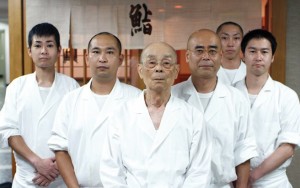Justin’s Japan: Tribeca Film Festival Q&A with director David Gelb on ‘Jiro Dreams of Sushi’
By JQ magazine editor Justin Tedaldi (CIR Kobe-shi, 2001-02) for Examiner.com. Visit his page here to subscribe for free alerts on newly published stories.
An indubitably delicious documentary, Jiro Dreams of Sushi follows 85-year-old master sushi chef Jiro Ono, owner of the esteemed ten-seat Sukiyabashi Jiro restaurant in Tokyo. From the ins and outs of the tuna auction to the proper way to massage an octopus, the film is a lushly photographed homage to the artisan sushi techniques that earned Jiro an elite three Michelin stars, one of just twenty-six restaurants in all of Japan to receive the honor last year.
This mouthwatering movie makes its New York bow Thursday (April 21) as part of the Tribeca Film Festival. In this exclusive interview, I caught up with director David Gelb to discuss his cinematic celebration of the art of sushi, along with its themes of family, tradition, and the value of hard work.
Tell us about your relationship and history with Japan.
When I was very young my parents took me to Japan on business trips. Even though I was only nine years old the third time I went, I already felt a tangible familiarity and affection to the food and the culture. The toys were definitely cooler. I was as fascinated by a history populated by samurai and warlords as much as the fiction with the giant robots and all that.
What else do you enjoy most about Japanese culture?
My favorite thing about the Japanese culture is the philosophy of specialization and mastery. There is a lot of value and respect for people that devote their lives to a single craft. You don’t see this as much in some Western countries.For example, in the USA, many local butchers have been driven out of business by supermarkets. Because of this, the sons of butchers are looking for other jobs to survive, and the skills they and their fathers have developed will be lost. In Japan, however, you’ll see more businesses dedicated to excellence before profits. Being a master butcher is a highly respected and potentially lucrative enterprise. Even in Japan, however, the consolidation of big business and globalization is a threat to craftsmen in small shops. According to many Japanese craftsmen that I interviewed, it has become harder to find young people that have the patience to learn a skill fully. In Japan, it takes years to become a master butcher.
What were your goals with this film? Did it turn out the way you originally anticipated, or did anything about it change during the production period?
Originally, this was going to be a much more general film that would feature many sushi chefs all over the world. In my mind it was the [celebrated BBC documentary] Planet Earth of sushi. I shot some short test segments, but then changed course and decided on a more human approach, making it just about Jiro and his family. Everything I wanted to convey about sushi was right here at Jiro’s restaurant.
How much time in all did you spend filming? Was it difficult to shoot in Japan and work around scheduling repeat visits to Tokyo?
I shot for the month of February in 2010, then returned to L.A. to work with my editor, Brandon Driscoll-Luttringer. After we spent a few months translating and reviewing the footage, we figured out what the story was about, and I returned to Japan to finish. I had some fantastic help on the ground in Tokyo—my translators Yukako Inoue and Shino Nakamura—to organize everything. Without them, it would have been extremely difficult.
What were Jiro and his family’s ground rules for making the film? Was there anything that you were forbidden from shooting?
The only rule was not to film the duo of incredibly hardworking and meticulous ladies that are in charge of cleaning and the cash register. It is a shame because one of the amazing things about Sukiyabashi Jiro is that it is probably the cleanest and most organized restaurant in the world. Literally not a spec of dust goes unchecked in the entire restaurant. The bottoms of the tables are just as clean as the tops. Women of that generation are particularly shy of cameras, and I was very careful to respect their wishes not to be filmed.
Read the rest of the interview here.



Comments are closed.